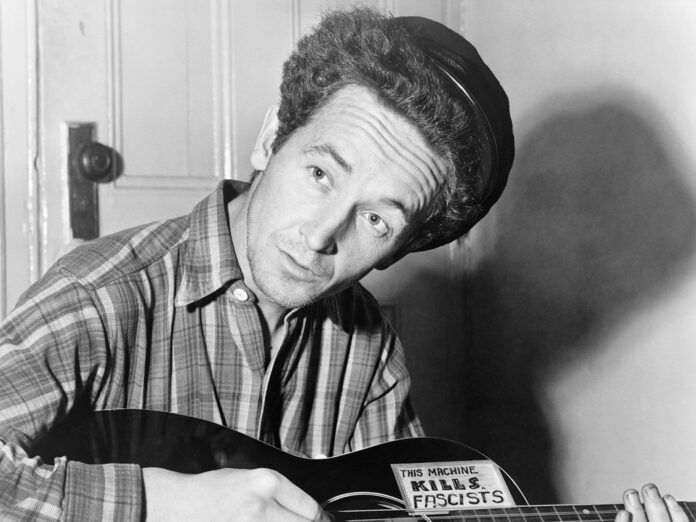When Bruce Springsteen accepted the 2021 Woody Guthrie Prize, awarded annually by the Woody Guthrie Centre, his set included “Deportee”, a song he’s performed since 1981. Carefully chosen from Guthrie’s huge catalogue, it’s a beautifully composed excoriation of the way the US treats migrant workers, written by Guthrie after a plane clash in 1948 killed 28 farm workers – referred to in coverage at the time only as “deportees”. Guthrie sought to humanise these anonymous workers, while challenging the iniquities of the system in which they were forced to exist.
When Bruce Springsteen accepted the 2021 Woody Guthrie Prize, awarded annually by the Woody Guthrie Centre, his set included “Deportee”, a song he’s performed since 1981. Carefully chosen from Guthrie’s huge catalogue, it’s a beautifully composed excoriation of the way the US treats migrant workers, written by Guthrie after a plane clash in 1948 killed 28 farm workers – referred to in coverage at the time only as “deportees”. Guthrie sought to humanise these anonymous workers, while challenging the iniquities of the system in which they were forced to exist.
The song has been performed by Dylan, Joni, The Byrds and many more – but while the words are Woody’s, the music is not. That’s because a recording by Guthrie himself did not exist, until now. Woody At Home (Volumes 1 & 2) contains 22 tracks recorded by Woody Guthrie in 1951 and 1952, including a version of “Deportee” as Guthrie meant it to be heard. The original melody is a talking blues, while the lyrics have a dramatic, empathic shift to the first person. There’s also a version of “This Land Is Our Land” with three new verses, plus another 13 songs that have never been heard at all. They are the last recordings Guthrie made before his hospitalisation for Huntingdon’s.
The tapes are raw and intimate, with Guthrie on guitar or singing unaccompanied against the background noise of family life – children talking, chairs scaping, doors slamming. There are dozens of these tapes, originally made by Guthrie for his publisher, Howie Richmond. While they have been known about for decades, the technology to restore them has only recently become available. That work was done by audio archive expert Steve Rosenthal, who cleaned up 45 songs that the Guthrie estate whittled down to 20, plus two spoken-word tracks in which Guthrie explains that a good song is always evolving. “I’ve never yet put a song on tape… that couldn’t be made better,” he drawls. “All of these things are highly gear-shiftable.”
The release is opportune for two reasons. Firstly, the depiction of Guthrie in A Complete Unknown brought the musician’s story to a younger generation; secondly, the new material contains songs with huge contemporary relevance. Take “Backdoor Bum And The Big Landlord”, a colourful parable about a rich man and poor man on a journey through the afterlife. It was recorded while Guthrie was living in an apartment block owned by segregationist Fred Trump, father of Donald. Guthrie quickly figured out Trump Senior for what he was, making him the subject of “Beach Haven Ain’t My Home” and “Trump Made A Tramp Out Of Me”. It’s very likely Trump inspired “Backdoor Bum…”, too.
“Buoy Bells From Trenton” is about the Trenton Six – six black men convicted of murder in 1948 by an all-white jury in all-too-familiar manner. The case was picked up by celebrities, among them Albert Einstein, who appears in Woody’s preamble before another new song. “Professor Einstein told me one day while we was riding a box car that he’d invent a theory that would do away with race hate,” Guthrie says, before unveiling “One Little Thing An Atom Can’t Do”, a timely song about the limits of modern technology compared to the human imagination and creative soul.
Guthrie experiments with well-known songs, including intriguing new versions of “Jesus Christ”, “Biggest Thing That Man Has Ever Done” and “Pastures Of Plenty” The latter is another song about migrant workers, while “Jesus Christ” makes the evergreen point that those who today most profess to love Christ would be the first to condemn him. The new version of “This Land Is Your Land” adds three verses and shifts perspective as Guthrie sings, “I can see your mailbox, I can see your doorstep”. Steve Rosenthal says it’s like “finding a new version of the ‘Star-Spangled Banner’.”
Many of the new songs cover the subjects we’d expect from Guthrie. “Innocent Man” is about racism, corruption and justice, while “Great Ship” is a story song about the sinking of the Lusitania. Sunken ships feature in “Lifebelt Washed Up”, a mysterious anti-war metaphor. “Peace Call” is a beautiful anti-war song that was previously set to music by Eliza Gilkyson. Now we have Woody’s original, more urgent version.
Other songs are a reminder that Guthrie didn’t just write about politics. “Forsaken Lover” is a gorgeous love song, never recorded by Guthrie although Kate Wolf recorded her take in 1978. “Funny Mountain” is another love song, while “My Id & My Ego” is a delightful ramble about our inner monologue, punctuated by tooting horns drifting through open windows. Rosenthal says it’s almost like a pop song.
But politics is the heart of the collection. It is, of course, profoundly depressing that the issues Woody Guthrie addressed more than 70 years ago remain unresolved. But Guthrie always tried to give his listeners hope as well as reason to continue the struggle. These songs are designed to empower. “Ain’t Afraid To Die” is a spine-strengthening spiritual while “You Better Git Ready” is a call-to-arms with a chorus to incite. Then there’s pugnacious anthem “I’m A Child To Fight”, on which he promises, “Look out you fascists, here I come”. Woody ain’t done yet.



